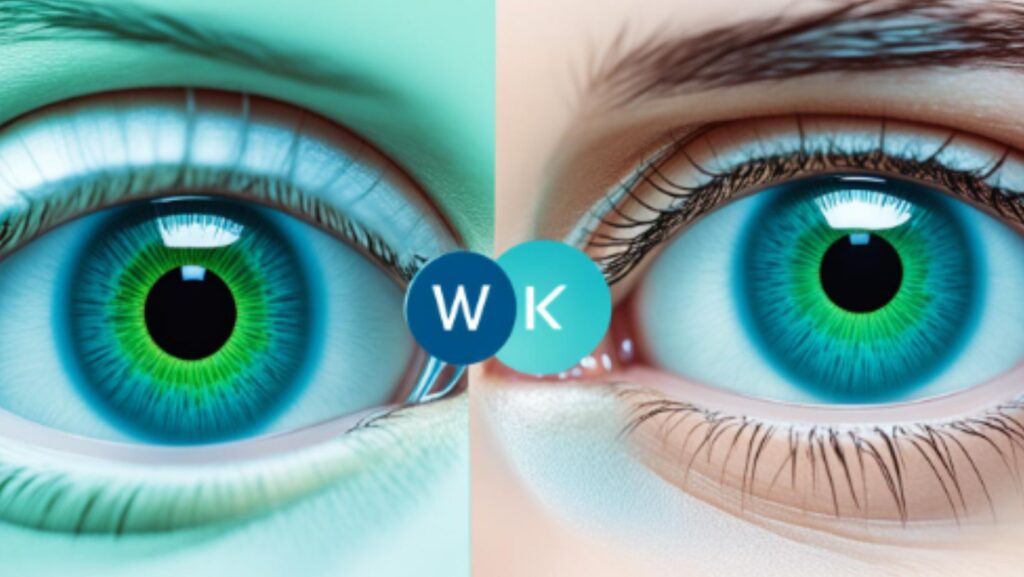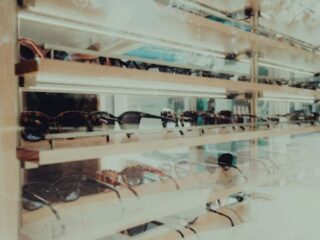
Choosing between LASIK and lens replacement surgery can be tough. Both promise better eyesight, but they have different benefits and drawbacks. We’ll look into the differences between LASIK and lens replacement. This will help you pick the best option for your vision needs and lifestyle.
If you’re dealing with nearsightedness, farsightedness, or astigmatism, knowing about LASIK and lens replacement is key. We’ll cover the good and bad of each, what to think about, recovery, and long-term results. This will give you the info to pick a vision correction that fits your goals and likes.
Understanding Vision Correction Options
Exploring vision correction can seem overwhelming, but knowing your options is key. There are many ways to fix common vision issues like nearsightedness, farsightedness, and astigmatism. You can choose from eyeglasses, contact lenses, or even surgery.
Eyeglasses are a straightforward way to improve your vision. They’re easy to get and can correct many vision problems. Contact lenses offer a more hidden way to see clearly. They let you see the world naturally, without glasses getting in the way.
There are also newer ways to fix vision issues, like LASIK, implantable contact lens surgery in Singapore, and lens replacement surgery. These options can change your life but think about the risks and benefits before choosing. Knowing the details of each method helps you pick the best one for your needs and lifestyle.
Weighing the Pros and Cons of LASIK
LASIK surgery is a popular way to fix vision problems. It offers a chance to see better for many people. But, it’s important to know the good and bad sides of LASIK before deciding.
One big plus of LASIK is it can make your vision much clearer. It can fix issues like nearsightedness, farsightedness, and astigmatism. This means you might not need glasses or contacts anymore. Plus, most people feel better within a few days after the surgery.
But LASIK isn’t without risks. You might experience dry eyes, see glare, or have trouble driving at night. In some cases, your vision might not get better, and you might need more surgery. It’s key to talk about these risks with your eye doctor.
Choosing LASIK is a big decision. You should think about what you hope to gain and what could go wrong. Knowing the pros and cons helps you make a choice that fits your goals and health.
Exploring the Advantages of Lens Replacement
Lens replacement is a way to fix vision problems that’s different from LASIK. It changes the eye’s natural lens with an artificial one. This is called an intraocular lens (IOL).
This method is great for many vision issues. It can fix problems like cataracts, nearsightedness, farsightedness, and astigmatism. By replacing the old lens with a new one, people can see clearly without glasses or contacts.
Lens replacement is also very flexible. Doctors can pick from many IOL types, like multifocal and toric lenses. This means they can tailor the treatment to each person’s eyes. It helps people see better and use glasses less.
It’s also a good choice for those who can’t have LASIK. This includes people with thin corneas or big pupils. Lens replacement works by fixing the eye’s problem directly. It helps improve how well people see and their quality of life.
Factors to Consider When Considering LASIK vs Lens Exchange
Considering LASIK vs lens exchange surgery requires careful thought. Your age, the severity of your vision issues, and your future goals matter a lot. Knowing these differences can help you pick the best option for you.
Your age is a key factor. LASIK is usually for younger people because their eyes are more stable. Lens replacement might be better for older people to fix vision problems like cataracts or presbyopia.
The severity of your vision problems also plays a big role. LASIK works well for mild to moderate vision issues like nearsightedness or astigmatism. Lens replacement is better for complex problems, like severe cataracts or refractive errors that LASIK can’t fix.
Think about your long-term goals and lifestyle too. LASIK has a shorter recovery time, great for active people. Lens replacement takes longer to recover from but can give you better and lasting vision correction, especially for age-related issues.
Considering these factors can help you choose the right vision correction for you. Talking to an experienced eye care professional can also give you valuable advice for this big decision.
Preparing for Your Vision Correction Procedure
Getting ready for LASIK or lens replacement is key to a good result. You’ll need a detailed eye exam and tests before your procedure. This makes sure you’re a good match for the surgery.
First, you’ll talk with your eye surgeon about your vision correction preparation. They will check your eyes closely. They’ll measure your cornea’s shape and thickness and check your eye health. This helps them pick the best way to fix your vision.
Before your preparing for lens replacement, you might need to change some habits. If you wear contact lenses, you might need to stop wearing them for a bit. This lets your eyes go back to their natural state. Your surgeon will tell you exactly what to do to get ready.
By getting ready to prepare for LASIK and following your surgeon’s advice, you’re setting yourself up for a smooth procedure. This careful planning leads to a clearer vision and more freedom in what you can do.
The Recovery Process: LASIK vs Lens Replacement
Choosing between LASIK and lens replacement for vision correction can be tough. Knowing how each affects recovery can help you decide what’s best for you.
LASIK recovery is usually quick. Most people see better in a day or two. In the first few days, you might feel dry eyes or be sensitive to light. But these issues usually go away in a week, and you can go back to your normal life in a couple of weeks.
Lens replacement takes longer to recover from. It involves putting in an artificial lens, which means more healing time. You might feel some discomfort, see blurry, or be sensitive to light for a while. It can take weeks to fully get used to your new lenses.
It’s key to follow your eye doctor’s advice during recovery. This ensures the best results. Knowing how each procedure affects recovery can help you choose the right one for you.
Long-Term Outcomes and Maintenance
When thinking about LASIK or lens replacement, knowing the long-term effects and upkeep is key. These procedures can greatly improve vision, but outcomes vary by patient and their needs.
For LASIK patients, the results are often great. Most people keep their clear vision for years. Yet, some might need more treatments to keep their vision sharp. Regular visits to an eye doctor are a must to keep LASIK working well.
Lens replacement offers a lasting fix for vision issues. The lenses put in are meant to replace the natural lens and work well for a long time. Still, seeing an eye doctor regularly is important to check everything is okay.
Choosing a vision correction method means sticking to eye care advice for the best results. This includes wearing eye protection, using eye drops as prescribed, and going for regular eye checks. Knowing what to expect in the long term helps patients make the right choice and keep their vision clear.
Choosing the Right Vision Correction Option
Choosing between LASIK and lens replacement for vision correction can be tough. Both have their own benefits, and the right choice depends on what you need and like. Think about the key factors to help you decide.
First, think about your current vision and any eye issues you have. LASIK is usually for people with mild to moderate vision problems like nearsightedness or astigmatism. Lens replacement might be better for those with cataracts or severe presbyopia.

Also, consider your lifestyle and how active you are. LASIK is quick and has a short recovery time. Lens replacement takes longer but can fix more serious vision issues for a long time.
The choice between LASIK and lens replacement depends on your vision needs, lifestyle, and what you prefer. By looking at these factors and talking to an eye care expert, you can pick the best option for your vision and life quality.
Conclusion
The debate between LASIK and lens replacement shows both have their benefits. By looking at each option’s pros and cons, you can choose what’s best for you. This choice should match your vision needs and future goals.
LASIK is known for its safety and effectiveness. It’s great for those wanting a fast recovery and freedom from glasses. On the other hand, lens replacement might be better for complex vision issues or a tailored solution.
Your choice between LASIK and lens replacement depends on your situation, lifestyle, and what you prefer. Talk to your eye care expert to weigh the options. This way, you can pick the best way to get a clear, comfortable vision for the future.
FAQ
What is the Difference Between LASIK and Lens Replacement Surgery?
LASIK reshapes the cornea with laser surgery to improve vision. Lens replacement surgery puts in an artificial lens instead of the natural one. Each has its own benefits and is right for different vision issues and patients.
Am I a Good Candidate for LASIK or Lens Replacement?
Your suitability for LASIK or lens replacement depends on your age, vision problems, eye health, and lifestyle. An eye doctor will check your needs and suggest the best option for you.
What are the Potential Risks and Complications of LASIK and Lens Replacement?
Both procedures are low-risk but can have issues like dry eyes, glare, and halos. Rarely, there could be infection or vision loss. Your surgeon will explain the risks and aim to reduce them during your surgery.
How Long is the Recovery Process for LASIK and Lens Replacement?
LASIK recovery is quick, with vision improving in a few days and normal activities in a week. Lens replacement takes longer, several weeks, but vision stays stable over time.
What are the Long-term Outcomes and Maintenance Requirements for LASIK and Lens Replacement?
LASIK results are usually stable, keeping vision clear for years. Lens replacement also offers lasting vision correction but might need more procedures or adjustments. Regular eye checks are advised for both.
How do I Decide Between LASIK and Lens Replacement?
Choosing between LASIK and lens replacement depends on your vision needs, lifestyle, and what you prefer. Think about your age, vision issues, and future goals. Your eye doctor can help you pick the best option for you.













